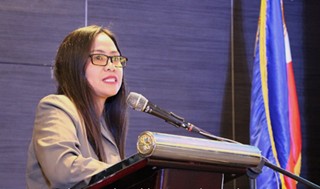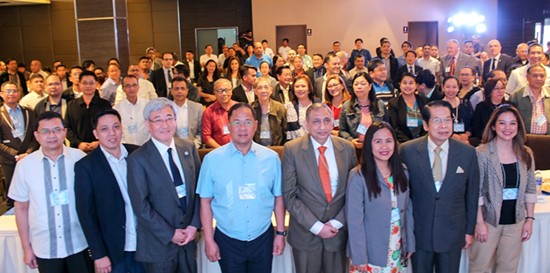NMP delivers paper during
the 2019 MET Conference hosted by MARINA
By
National Maritime
Polytechnic
March 18, 2019
TACLOBAN CITY – The
National Maritime Polytechnic (NMP) attends the 2019 Maritime
Education and Training (MET) Conference conducted in Manila last
February 21-22, 2019 with the theme “Seafarers of the Future: Trends
in Maritime Education and Training”.
The activity was hosted by
the Maritime Industry Authority (MARINA) in partnership with the
International Association of Maritime Universities (IAMU), aimed to
encourage an interactive discussion among stakeholders that will
result to conclusions and preferable actions gearing towards further
improvement of the Philippine MET System.
 During the conference, NMP
Deputy Executive Director, Ms. Mayla N. Macadawan presented and
discussed the topic “Innovating MET: Responding to Societal Change”.
During the conference, NMP
Deputy Executive Director, Ms. Mayla N. Macadawan presented and
discussed the topic “Innovating MET: Responding to Societal Change”.
The NMP paper highlighted
the current and emerging trends in shipping involving global
connectivity, rapid technological advancements, autonomous shipping
and digitalization. These advancements will eventually result to:
(a) Need for seafarers who are capable to effectively perform
present and future roles, with new sets of skills for hybrid,
upskilled responsibilities; (b) Decision-making in some elements of
the voyage to shift from on board to onshore with the advent of
autonomous shipping; and (c) Dramatic change in the roles and
functions of the seafarers in the future, may require a new training
regime.
Moreover, aforementioned
developments will correspondingly require new skills requirements
for seafarers and will also demand innovating MET, which may
include:
• Use of simulators in
high intensity training and assessment, with a syllabus that builds
situational awareness by exposing students and trainees to repeated
critical situations onboard (e.g. crisis-response scenarios) of
progressively increasing levels of risk and complexity. Within a
period of time individuals will attain satisfactory level of
competence thru this high intensity training and assessment. The use
of simulators, which are designed to replicate actual equipment
onboard, thru the high intensity training concept may even be
considered as effective replacement to reduce sea service.
• Integration of
knowledge, skills and understanding (KSU) of automation in basic
maritime education and development of short training course for
existing seafarers.
• Significant training in
information technology (IT), with emphasis on cyber technology.
• Use of e-learning and
e-assessment platforms
• Development, production
and dissemination of Open Educational Resources (OER) for maritime
instructors and assessors
• Synergy among local and
international stakeholders
• Research-based
development of MET programs
• Evaluation and
verification of MET programs by stakeholders and certifying bodies;
and
• Harmonization &
standardization of MET programs
Further, MARINA STCWO DED
Atty. Joy Vera Ban-eg presented the developments since the last MET
Conference held in 2018 that included NMP’s role as Center for
Faculty Development as reflected in the Manifesto of Commitment
signed by the stakeholder participants.
These circumstances signal
employment opportunities to Filipino seafarers and at the same time
pose challenge in sustaining the development of globally competitive
seafarers. This brings the attention of all maritime institutions,
such as NMP, on their readiness of addressing the significant new
training requirements of the STCW 2010 Manila Amendments and the
development of value-added programs to respond to the demand trends.
NMP, as a maritime
training and research agency, remains on guard for new developments
in MET as these are crucial considerations in the accreditation,
validation and improvement processes of its training programs. It
continuously endeavors to precipitate and capitalize in program
offerings and ensures that measures are undertaken to keep abreast
with evolving standards and other industry requirements.
On the pipeline and in
line with the NMP’s vision of being the Philippines’ leader in
maritime training, including e-learning and research, NMP is
embarking on the conversion of its Gender Sensitivity Training for
Seafarers (GSTS) to an e-Learning Platform/Format and is scheduled
to be completed in the first semester of CY 2019.
The conference was
attended by more than 200 representatives from IAMU member
institutions in the Asia Pacific Region, Commission on Higher
Education (CHED), maritime higher education institutions (MHEIs),
maritime training centers (MTCs), seafarer associations, research
groups and course developers, maritime instructors, as well as
manning agencies.
Meanwhile, NMP continues to upgrade its facilities and provide
maritime trainings required pursuant to the STCW Convention as
amended in 2010 including value-adding courses towards improving the
qualifications of Filipino seafarers for their employment
acceptability and enhanced competitiveness. It also regularly
conducts maritime studies to come up with policies for the
improvement of the manpower sector of the industry.
Those interested in NMP research undertakings may visit the NMP
website (www.nm.gov.ph) and access the e-Research Information System
Portal which is designed to gather inputs for NMP’s research,
dissemination of NMP completed researches and other articles
pertaining to maritime research.
For more information about NMP trainings viewers may visit the
agency’s facebook page (www.facebook.com/nmptrainingcenter) where
all related information on NMP trainings are available.
Further, NMP encourages seafarers to avail of the NMP-OWWA (Overseas
Workers Welfare Administration) Seafarers’ Upgrading Program (SUP)
which entitles the beneficiary to receive financial assistance for
training costs from the OWWA.
|

NMP
Deputy Executive Director, Ms. Mayla N. Macadawan (1st row -
3rd from the right) during the 2019 MET Con on 21-22
February 2019. |